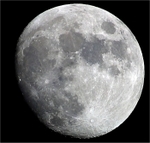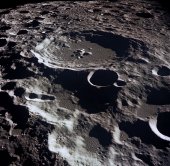
Worksheets and No Prep Teaching Resources
Reading Comprehension Worksheets
Moon
Solar System

Moon
 Worksheets and No Prep Teaching Resources Reading Comprehension Worksheets Moon Solar System |
 Moon |
| edHelper's suggested reading level: | grades 5 to 8 | |
| Flesch-Kincaid grade level: | 5.52 |
|
The Man in the Moon?
By Cindy Grigg |

|
 1 When you were little, you may have been told a story about "the man in the moon." When we look at the full moon, it almost looks like it has a face. What are these different areas?
1 When you were little, you may have been told a story about "the man in the moon." When we look at the full moon, it almost looks like it has a face. What are these different areas? |
Create Weekly Reading Books
Prepare for an entire week at once! |
| Leave your feedback on The Man in the Moon? (use this link if you found an error in the story) |
 |
Moon
|
 |
Solar System
|
 |
Science
|